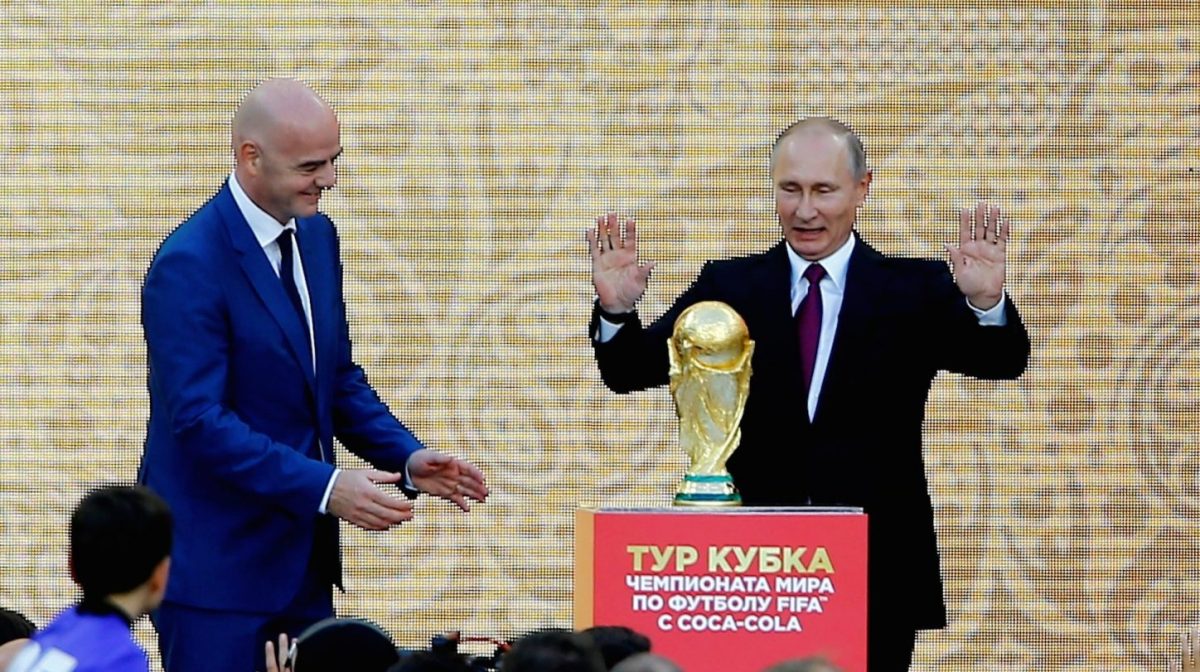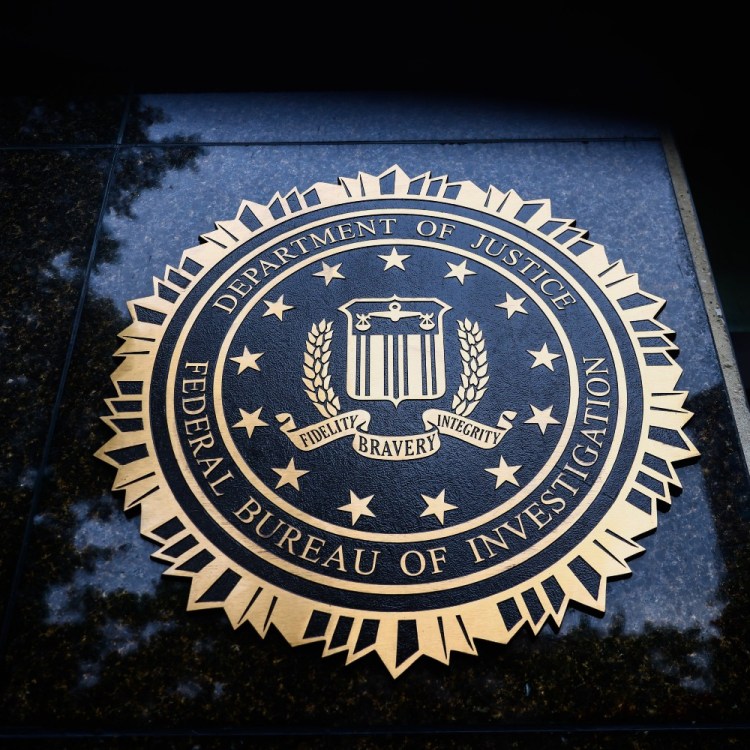In 1942 and 1946, World War II and its aftermath caused the World Cup to be canceled. Otherwise, the Cups have proceeded as scheduled. Which makes sense: They happen only once every four years and 31 nations must fight their way through qualifying just to get there. (The 32nd is the pre-qualified team from the host nation—and they hardly get a free ride, since hosting a World Cup requires a country to spend billions.)
For a month, the planet gets to fixate on soccer. Once complete, international tensions can resume.
2018, however, seems to be different. This is how Vladimir Putin and general corruption have made the coming World Cup uniquely troubling.
Russian Conduct at Home. If it’s an honor to host a World Cup, is this really the moment to let Russia take that victory lap? Putin reportedly received 76.6 percent of the vote in winning a fourth term as president. It’s an impressive margin, particularly since the Russian economy is a mess—it’s largely been shrinking in recent years. Happily, one Russian is successfully weathering the downturn: Putin. Rumors suggest a healthy chunk of Russian wealth goes directly into his pocket. Hermitage Capital Management CEO Bill Browder has estimated that Putin embezzled so mightily his personal net worth is $200 billion. (This would explain how a former KGB agent reportedly acquired a vacation home with a value estimated at $1 billion.)
So how did Putin win? He controls the Russian media, his leading opponent was banned from running and those who oppose or criticize him tend to wind up dead. Putin was so confident about this election’s outcome he only attended two rallies during the entire campaign.
Troubling as all this may be, the soccer world can ignore it. (Hey, Benito Mussolini hosted a World Cup in 1934.) Nations can rationalize: “What happens inside their borders is their business—what happens inside ours is ours.”
Which would be a better argument if Putin respected borders.
Russian Conduct Abroad. Russia aggressively meddles in foreign elections, both in the United States and throughout Europe. Theoretically, this can be disregarded, based on the reasoning, “Well, it’s not like they attacked us with nerve agents or anything.”
At least, that was the case right up to the nerve agent attack on a former spy and his daughter in the U.K.—both remain in critical condition. This becomes particularly disturbing because traces of the nerve agent were left at both a restaurant and a pub. (An order was issued that hundreds of people needed to wash their clothes.) Beyond the implications of carrying out an assassination in England, large numbers of innocent civilians were placed at risk.
(Putin has denied the attack but utterly failed to convince the British of his innocence—Foreign Secretary Boris Johnson declared, “There is something in the kind of smug, sarcastic response that we’ve heard that indicates their fundamental guilt. They want to simultaneously deny it, yet at the same time to glory in it.”)
Let’s say we still choose to ignore anything even vaguely political and focus on purely sporting grounds.
The Last Time Russia Hosted a Major Sporting Event, They Cheated Like Their Lives Depended on It. Ah, the 2014 Sochi Winter Olympics. It gave us this unforgettable moment.
Unfortunately, it also gave us a frightening amount of systematic doping by the Russian team. They actually came up with a system where positive urine samples could simply be swapped for clean ones at the lab. The Oscar-winning documentary Icarus explores how the process worked.
This isn’t to say that Russian cheating was limited to Sochi. (The program was up and running in a huge way at the 2012 London Games.) Nor was it necessarily limited to drugs. (The 2016 Rio Olympics saw a removal of boxing judges and referees after Russian fighters won decisions in bouts pretty much everyone thought they lost handily.)
The result was that Russia was banned from the 2018 Olympic Games, though at the last minute the International Olympic Committee allowed a contingent of “Olympic Athletes from Russia” to compete. These athletes had one mission: Don’t get caught cheating. The IOC has been notoriously lenient with Russia, meaning a single Olympics where they stayed out of trouble might enable them to speed through any sanctions.
You can see where this is going.
With Everything on the Line, Russia Kept Cheating. One Russian athlete was cited for cheating in curling—yes, curling—and a second was caught in the bobsledding. Considering it took years to untangle the last scandal, there is every reason to think more athletes will ultimately be implicated.
Today, cheating isn’t a part of the Russian sporting culture: It is the Russian sporting culture.
And let’s bring it back to soccer, because…
Cheating Is How Russia Got to Host the World Cup in the First Place. We will almost certainly never know the full story of Russia’s World Cup bid. (One major impediment: Russia destroyed all the computers involved in the process.) However, it appears they won votes through old-fashioned bribery, including giving artwork to one particularly cultured voter. FIFA’s own investigation largely confirmed the corruption, though in classic FIFA fashion declined to re-vote the World Cup bid or do anything else to incentivize obeying the rules in the future.
And if you think the 2018 World Cup in Russia is bad…
The 2022 World Cup Could Be Truly Monstrous. Qatar and Russia both appear to have relied on bribery for their winning World Cup bids. But say this for Russia: At least they’ve yet to be accused of using slave labor for World Cup construction.
Seriously, Why Are We Still Going Along With This? How corrupt is FIFA? Soccer’s ruling body is responsible for this:
Featuring Tim Roth, Gerard Depardieu and Sam Neill doing some of the worst work of their careers, the 2014 motion picture United Passions managed a score of 0% at Rotten Tomatoes and was called a “disaster” by its own director. It is a tale about the genius of FIFA executives. Who would finance such a movie? You guessed it: FIFA executives! They pumped $22.2 million into the project. (They also modestly suggested two possible titles: Men of Legend and The Dreammakers.)
For their efforts, they generated $918 at the U.S. box office—and no, that figure isn’t missing any zeros. (Actually, that may be high—Box Office Mojo reported it had actually made only $607.)
This is how they conduct themselves publicly: Proudly squandering millions on an idea both wildly egomaniacal and incredibly stupid. (Seriously, they made a film about executives who greenlight a tournament every four years?) Imagine how they are behind closed doors.
Why We Should Boycott. At this point I acknowledge a basic truth: It’s easy for an American to call for a World Cup boycott. (After all, our team wasn’t invited.) But if we don’t take drastic steps, do we really think anything is going to change? We let Putin host an Olympics a mere four years ago and Russian simply grew more aggressive in its attacks on other nations. Quite simply, the only wakeup call Putin will actually hear is if this June the stadiums and facilities on which Russia spent at least $11.8 billion are surprisingly empty. (As a bonus, FIFA will finally realize the money train can actually be stopped.)
Will it hurt to lose a World Cup? Absolutely. Who wouldn’t want to see a possible Germany-Brazil rematch after what happened in 2014?
But it won’t hurt that deeply.
Why the World Cup No Longer Matters As Much. Once the World Cup was the one time much of the planet actually got to see star players. Pele played in Brazil, so Europeans only appreciated him fully during his 1958 and 1970 Cup runs. (Pele was injured for most of Brazil’s 1962 title performance.) Likewise, South Americans finally got to appreciate the greatness of midfielder Franz “Der Kaiser” Beckenbauer when he led Germany to the 1974 title.
Times have changed, however. By 1977, that duo were teammates on the New York Cosmos. Today, the Champions League features the finest players from every continent both playing with and competing against each other week in and week out … and it’s all easily watchable everywhere on the globe. And “everywhere” truly means everywhere. The magnificent Didier Drogba was born in the Ivory Coast and went on to play in France, England, China, Turkey, Canada and the U.S. David Beckham has even played football on Antarctica and, naturally, Becks filmed it.
In short: It’s worth holding out for a World Cup done right. C’mon, Planet Earth: Skip Russia in 2018, leaving Putin to awkwardly play keepie uppie with a few FIFA execs and Steven Seagal. When 2022 comes around, maybe we’ll again have something worth celebrating.
Whether you’re looking to get into shape, or just get out of a funk, The Charge has got you covered. Sign up for our new wellness newsletter today.
























